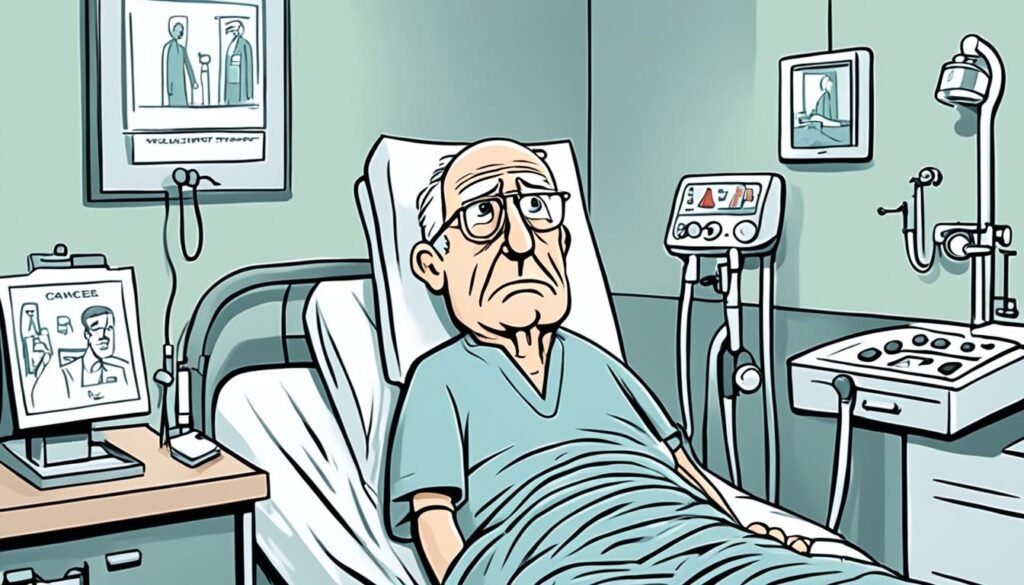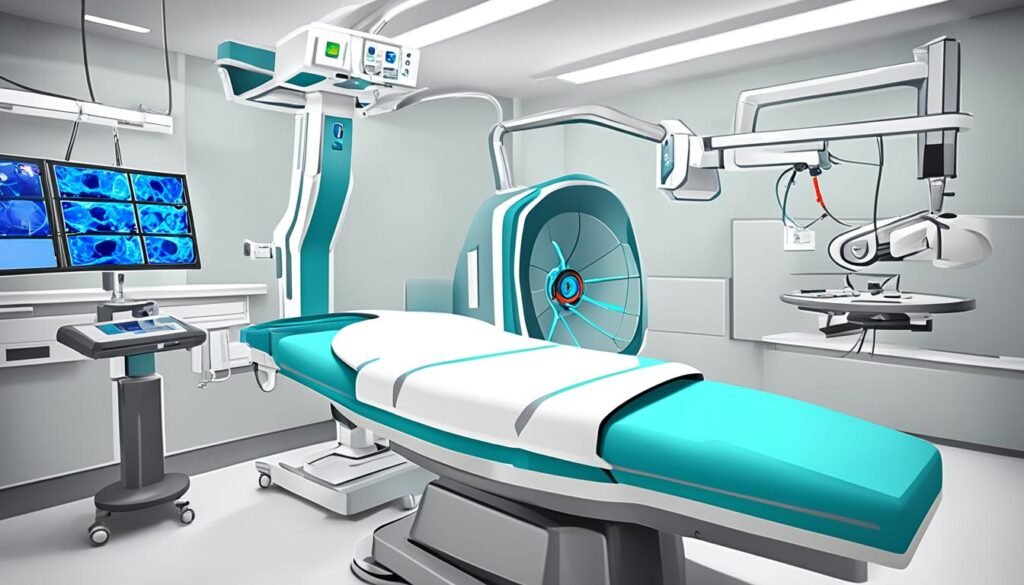Rectal cancer starts in the rectum, the last part of the big intestine. Treatment often has radiation, chemo, and surgery. But now, we’re learning about non-surgical choices. These can treat rectal cancer well. They might also lower side effects and make life better for patients.
Table of Contents
ToggleClinical Trial Explores Radiation-Free Rectal Cancer Treatment
A trial by Dr. Deb Schrag at Memorial Sloan Kettering Cancer Center looked at a new way to treat rectal cancer. This method doesn’t use radiation therapy. Over 1,100 patients in the PROSPECT trial were split into two groups to test this.
Radiation-Free Rectal Cancer Treatment Clinical Trial Results
After 5 years, results came in showing the FOLFOX-only group did as well as the chemoradiation group. This includes disease-free and overall survival. In the PROSPECT trial, less than 10% of those in the FOLFOX group needed radiation later.
Potential Benefits of Skipping Radiation Therapy
Skipping radiation might save fertility, sexual function, and bone marrow health. It could also help people in far-off or underserved areas lacking radiation clinics. Fewer people needing an ostomy was seen in those who just got FOLFOX before surgery.
Side Effects of Standard Rectal Cancer Treatment
Standard rectal cancer treatment uses radiation, chemotherapy, and surgery. This approach can have big side effects. For women, radiation to the pelvic area can harm fertility and lead to early menopause. It can also affect the bowel and sexual function. Issues with bowel and sexual behavior are common. For young patients, this might affect their plans to have kids later.
Impact on Fertility and Sexual Function
Radiation for rectal cancer affects a lot. It can make women infertile and bring early menopause. It also causes bowel and sexual function issues. This situation is hard, especially for young patients wanting to have children.
Effects on Bone Marrow and Chemotherapy Tolerance
Rectal cancer radiation can also harm your bone marrow. Your bone marrow makes blood cells. This can lower your blood cell counts. And, it makes chemo harder to handle if cancer comes back. Keeping your bone marrow healthy is key for your treatment’s success.

The PROSPECT Clinical Trial: FOLFOX Regimen vs Chemoradiation
The PROSPECT trial aimed to see if FOLFOX chemo before surgery worked as well as standard chemoradiation then surgery. FOLFOX uses 5-fluorouracil (5FU), oxaliplatin, and leucovorin.
FOLFOX Chemotherapy Regimen Before Surgery
In the trial, some patients got FOLFOX chemo first, and others got the usual chemoradiation. FOLFOX chemo showed similar results to chemoradiation. This means FOLFOX alone might help as much as chemoradiation for some local rectal cancer patients.
Trial Design and Outcomes
The study included 1194 patients with local rectal cancer. Most had cT3 disease. FOLFOX’s effectiveness matched chemoradiation’s for survival over 5 years.
FOLFOX after surgery caused more side effects if patients had chemo before too (32.6% vs. 25.6%). Severe effects were also more common with FOLFOX. Chemo and radiation together (CRT) were better for most patient outcomes.
Radiation Therapy Still Necessary in Some Cases
The PROSPECT trial uncovered a big finding. It suggested some patients with advanced rectal cancer might not need radiation therapy. However, Dr. Schrag reminds us that radiation therapy is vital for others. This includes around 10% of trial patients who didn’t fully respond to FOLFOX. For them, adding chemoradiation was necessary.Additionally, FOLFOX alone might take longer and can have side effects, like neuropathy in the hands. So, radiation therapy is a crucial choice for certain patients, especially if chemo doesn’t work well enough.
The PROSPECT trial’s conclusions were eye-opening. They pointed out that some folks with advanced rectal cancer could skip radiation. But not everyone. A small group still needed chemoradiation, on top of their treatment plan. The FOLFOX-only method also has its drawbacks. It might mean longer treatments and possible side effects. So yes, radiation therapy is still important in treating rectal cancer for those not fully helped by chemo alone.

A Patient’s Successful Treatment Without Radiation
Marc Scarduffa took part in the PROSPECT clinical trial at Memorial Sloan Kettering Cancer Center. He successfully dealt with his stage 3 rectal cancer without using radiation. This option was great for him since he knew the possible side effects of regular treatments.
Scarduffa chose to go with the FOLFOX chemotherapy before surgery. This decision led to minimal side effects. He continued living an active life, including traveling internationally for work. He praised the care at MSK and was thankful for the trial. Scarduffa thinks not using radiation was the best choice for his cancer treatment.
This non-surgical approach helped Scarduffa a lot. Skipping radiation meant his quality of life stayed good. Plus, he avoided the bad side effects of radiation. This matches what the PROSPECT trial found. It showed that using FOLFOX chemo alone gave results like using radiation on people. These results included not having the disease back and living longer after treatment.

Benefits for Rural Patients and Global Access
The PROSPECT trial looked into a radiation-free way to treat rectal cancer. This may help patients who live far from big cancer centers, both in the US and around the world. Normally, treating with chemoradiation takes 28 visits over 5.5 weeks. But the FOLFOX regimen needs only about 6 visits across 12 weeks. This is good news for patients who can’t easily reach cancer centers. They might live in areas without many radiation therapy options. Dr. Schrag thinks the FOLFOX method is better where radiation treatment is hard to get.
Patients in rural areas don’t always get the same cancer care as those in cities. Even though they get cancer at the same rate, their outcomes are often worse. This is because small hospitals in rural places might not have enough resources or staff. It’s hard for them to give full cancer care. But, the University of Kentucky Markey Cancer Center Affiliate Network (MCCAN) is changing this. It helps rural hospitals meet high cancer care standards. As a result, patients in these areas do better.
With MCCAN’s help, rural hospitals are getting better at treating cancer. This model could be used in more rural places, making care better for everyone. To do this, we need to look at the fact that not many cancer doctors work in rural areas. Yet, many people live there. In over 70% of places in the US, there are no cancer doctors.
Getting to cancer care in rural areas is hard for many patients. Residents of large rural towns spend about 51 minutes going for treatment. People in small or isolated towns travel just a bit longer, about 59 minutes. Only 2% of health social workers are in rural areas, which means less mental health support for cancer patients. Before, people in rural places often didn’t have health insurance. But with new laws, many could now get help to pay for medical care.
The PROSPECT trial’s new way to treat rectal cancer is a game-changer. It needs less travel and is good for patients in hard-to-reach places. This could make cancer care better for everyone, in rural areas and all around the world. It aims to reduce the difference in cancer survival between rural and urban patients. Its goal is to make sure all patients can get the best cancer care possible.
rectal cancer treatment without surgery
The PROSPECT trial looks into a radiation-free way to treat rectal cancer. Besides this, there are other methods without surgery based on the cancer’s stage. For example:
- Stage 0: Removing the polyp or tumor using methods like polypectomy, local excision, or transanal resection
- Stage I: For small, early-stage tumors, transanal resection or transanal endoscopic microsurgery (TEM) is an option.
- Stage II and III: Total neoadjuvant therapy mixes chemotherapy and radiation before any operation. This can save the patient’s organs in some cases.
For patients with rectal cancer, these non-surgical choices can work well. This depends on how advanced the cancer is. It also offers a way to keep a good quality of life without the big impact of surgery.

Treating Stage 0 Rectal Cancer Without Surgery
Stage 0 rectal cancers are small. They have not spread past the rectum’s inner lining. Usually, surgery isn’t needed to treat them. Treatment options for this early stage focus on removing or destroying the cancer.
Methods like polypectomy and local excision are used. These are less invasive than full surgery.
Rarely, a stage 0 case might need more than minor surgery. But usually, surgery isn’t the first choice.
Organ-preserving steps are more common for early-stage rectal cancers. These steps are very good at treating the cancer. They also help keep the patient’s life as normal as possible.
Treating Stage I Rectal Cancer Without Surgery
Stage I rectal cancers grow into the rectal wall’s deeper layers but don’t spread beyond. Surgery may not be needed for some cases. This includes when the cancer was a polyp removed during a colonoscopy.
In some instances, stage I rectal cancer can be treated without surgery. This treatment can happen through the anus, avoiding the need for abdominal surgery. Techniques like transanal resection or transanal endoscopic microsurgery (TEM) are used for this.
Transanal Resection for Early-Stage Cancers
Minimally invasive procedures like transanal resection for rectal cancer work well for early-stage cases. They aim to keep the patient’s life quality high. Transanal resection removes the cancerous area through the anus, avoiding major abdominal cuts. It’s a choice for small, early-stage rectal cancers limited to the inner rectal layers.
Transanal resection avoids the bigger surgeries often used for rectal cancer. This saves from complications like sexual issues, urinary troubles, and bowel changes. It’s especially good for older patients or those with health problems that make major surgery risky.
Non-Surgical Options for Stage II Rectal Cancer
Stage II rectal cancers have grown through the rectal wall but not reached lymph nodes. Usually, doctors suggest chemotherapy, radiation, and surgery. But, a method called total neoadjuvant therapy (TNT) might work. It could let patients have treatments that avoid removing organs.
Total Neoadjuvant Therapy Approach
TNT gives chemotherapy and radiation before the operation. This way has promising results for people with advanced rectal cancer. Doing TNT may lead to very good reactions to treatment. Some even get complete remission, linked to 80% not having the disease back for three years.
Immunotherapy for dMMR/MSI-H Tumors
For stage II rectal cancers with certain genetic signs (dMMR/MSI-H), immunotherapy might be best. In these situations, immunotherapy might avoid the need for chemo, radiation, and surgery. This gives some rectal cancer patients a treatment choice without surgery.
Non-Surgical Treatment for Stage III Rectal Cancer
The treatment plan for stage III rectal cancer is much like stage II. It includes chemotherapy, radiation, and surgery. Yet, for some patients, there are non-surgical choices like total neoadjuvant therapy or immunotherapy for specific genes. The exact non-surgical treatment for stage III rectal cancer varies. It depends on how a patient responds to the first rounds of treatment.
Total neoadjuvant therapy (TNT) is a non-surgical option. It uses chemo and radiation before surgery. This helps shrink the tumor. For about 30% of patients, the tumor disappears completely with this treatment. They might not need surgery, and they have a good chance of staying cancer-free.
For cancers with specific genetic markers, immunotherapy might be better. It boosts the body’s immune system to fight the cancer. This treatment might eliminate the need for other therapies or surgery in some patients.
It’s good to know that non-surgical treatments are available for stage III rectal cancer. Still, surgery is needed for some patients. If the cancer comes back locally after non-surgical treatment, it might be harder to treat. This highlights the need for close follow-up care and check-ups.
Deciding on non-surgical treatment requires talking with your healthcare team. They will consider your response to the first treatments and what you prefer. Exploring new treatments could help control your cancer without as many risks as surgery.
Managing Stage IV Rectal Cancer Without Surgery
Stage IV rectal cancer means it has spread to distant parts of the body. The focus shifts to palliative care and improving life quality. Non-surgical ways are often top choices for treatment.
Palliative Treatments
Palliative treatments aim to ease symptoms and make you feel better. They are not meant to cure the cancer. Surgery might be done to stop bleeding or open blocked bowels.
Interventions like surgery can really help the patient feel better. They improve the quality of life, even without curing the cancer completely.
Chemoradiation and Systemic Therapy
Some patients with stage IV rectal cancer get chemoradiation therapy or systemic chemotherapy. Though not a cure, these treatments can slow the cancer and help with symptoms. The plan depends on the patient’s health and care goals.
Treating Recurrent Rectal Cancer Without Surgery
Dealing with recurrent rectal cancer can be hard. Yet, there are treatment options that don’t involve surgery, which can work in some cases. The plan for treatment depends on where the cancer is and how far it has spread.
Management of Local Recurrence
A local recurrence happens when the cancer comes back in the pelvic area. Doctors might remove the tumor with surgery. They could also use radiation or chemo. The aim is to get rid of the cancer and keep a good quality of life for the patient.
Treatment for Distant Recurrence
If the cancer has spread to places like the liver or lungs, there are different treatments. These include chemo, targeted therapy, or immunotherapy. Sometimes, surgery for these metastatic spots may help. But for many, the goal will be palliative care, focusing on comfort and improving life quality.
For all recurrent cases, personalized treatment and close checks are crucial. Regular visits, tests, and exams help find any return of the cancer early. This allows for the best non-surgical treatments. Also, clinical trials might offer new treatment chances for those with recurrent rectal cancer.
FAQ
What are the non-surgical treatment options for rectal cancer?
Researchers are looking into new ways to treat rectal cancer without surgery. One method is to use FOLFOX chemotherapy by itself before an operation. Another approach combines chemotherapy and radiation before surgery, called total neoadjuvant therapy. These methods might lower side effects and make life better for patients.
How does the FOLFOX-only approach compare to the standard chemoradiation treatment for rectal cancer?
The PROSPECT trial found that using FOLFOX alone was as good as the usual treatment with FOLFOX and radiation combined. Both approaches had similar success rates in keeping the cancer away, helping patients live longer, and controlling cancer’s return. This shows that for some people with advanced rectal cancer, using only FOLFOX might be a good choice.
What are the potential benefits of skipping radiation therapy for rectal cancer treatment?
Not having radiation therapy can save important body functions like fertility, sexual ability, and bone marrow. It can also be better for patients who live in places without many radiation treatment centers.
What are the side effects of traditional rectal cancer treatment?
Standard treatment for rectal cancer includes radiation, chemotherapy, and surgery. It can harm the reproductive system, disrupt bowel and sexual functions, and affect bone marrow health.
How does the PROSPECT trial’s radiation-free approach benefit patients?
The PROSPECT trial showed that using only FOLFOX before surgery was about as good as the usual treatment with radiation. This means that some patients could skip the side effects of radiation. It’s especially good news for younger patients who want to have children in the future.
Are there any cases where radiation therapy is still necessary for rectal cancer treatment?
Indeed, about 10% of patients in the PROSPECT trial needed the extra help of chemoradiation because FOLFOX wasn’t enough. Sometimes, radiation is still a key part of treatment, especially if chemotherapy doesn’t work well on its own.
How can non-surgical treatment options benefit patients in rural and underserved areas?
The FOLFOX-only treatment doesn’t require as many visits and can be a big help for those who live far from cancer centers. This is true not just in the U.S., but all over the world, where radiation therapy might not be easy to get to.
What non-surgical options are available for treating early-stage rectal cancer?
For the earliest stages of rectal cancer, procedures like polypectomy, local excision, or transanal resection might be all that’s needed. If cancer has grown a little more, removing it through the anus with surgery might still work well. Doctors can do this with techniques like transanal resection or TEM.
What non-surgical options are available for treating advanced-stage rectal cancer?
For more advanced cancer, a mix of chemotherapy, radiation, and surgery is the usual advice. But, some people might benefit from total neoadjuvant therapy or immunotherapy, depending on their unique genetic makeup. In the latest stage of the disease, treatments focus on making life better by managing symptoms.
How is recurrent rectal cancer treated without surgery?
If the cancer comes back in the same place, doctors might remove it with surgery, sometimes adding radiation or chemotherapy. If it has spread, treatments could involve surgery to remove the spread, or chemo, targeted therapy, or immunotherapy. Sometimes, making the patient comfortable is the main goal in these cases.
Source Links
- https://www.mskcc.org/news/folfox-rectal-cancer-treatment-without-radiation-new-option
- https://www.cancer.org/cancer/types/colon-rectal-cancer/treating/by-stage-rectum.html
- https://www.mskcc.org/news/rectal-cancer-disappears-after-experimental-use-immunotherapy
- https://www.ncbi.nlm.nih.gov/pmc/articles/PMC9113208/
- https://www.cancer.gov/news-events/cancer-currents-blog/2023/rectal-cancer-skip-radiation-before-surgery
- https://www.ncbi.nlm.nih.gov/pmc/articles/PMC6737323/
- https://classic.clinicaltrials.gov/ct2/show/NCT01515787
- https://www.ncbi.nlm.nih.gov/pmc/articles/PMC10500448/
- https://www.hopkinsmedicine.org/health/conditions-and-diseases/colon-cancer/rectal-cancer-treatment
- https://www.mayoclinic.org/diseases-conditions/rectal-cancer/care-at-mayo-clinic/mac-20352891
- https://www.uchealth.org/today/rectal-cancer-treatment-without-surgery/
- https://www.ncbi.nlm.nih.gov/pmc/articles/PMC9524475/
- https://www.cancernetwork.com/view/challenges-rural-cancer-care-united-states
- https://www.ncbi.nlm.nih.gov/pmc/articles/PMC9264788/
About The Author

This article is medically reviewed by Dr. Nivedita Pandey, Senior Gastroenterologist and Hepatologist, ensuring accurate and reliable health information.
Dr. Nivedita Pandey is a U.S.-trained gastroenterologist specializing in pre and post-liver transplant care, as well as managing chronic gastrointestinal disorders. Known for her compassionate and patient-centered approach, Dr. Pandey is dedicated to delivering the highest quality of care to each patient.
→ Book a consultation to discover which remedies suit your needs best.
About Author | Instagram | Linkedin





